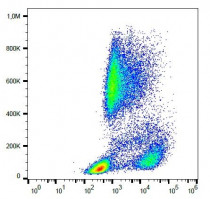ARG65409
anti-CD62P / P-Selectin antibody [AK4] (FITC)
anti-CD62P / P-Selectin antibody [AK4] (FITC) for Flow cytometry and Human,Primates
Cell Biology and Cellular Response antibody; Developmental Biology antibody; Immune System antibody
Overview
| Product Description | FITC-conjugated Mouse Monoclonal antibody [AK4] recognizes CD62P / P-Selectin |
|---|---|
| Tested Reactivity | Hu, NHuPrm |
| Tested Application | FACS |
| Specificity | The clone AK4 recognizes an extracellular epitope of CD62P (P-selectin), a 140 kD single chain type I transmembrane glycoprotein present in secretory alpha-granules in platelets, in Weibel-Palade bodies in endothelial cells and in megakaryocytes; it is relocated to the plasma membrane upon activation.
Workshop: HLDA VI: WS Code P-44. |
| Host | Mouse |
| Clonality | Monoclonal |
| Clone | AK4 |
| Isotype | IgG1 |
| Target Name | CD62P / P-Selectin |
| Antigen Species | Human |
| Immunogen | Human platelets |
| Conjugation | FITC |
| Alternate Names | PADGEM; CD62; Platelet activation dependent granule-external membrane protein; CD62 antigen-like family member P; GMP140; PSEL; Granule membrane protein 140; CD62P; CD antigen CD62P; Leukocyte-endothelial cell adhesion molecule 3; GRMP; GMP-140; P-selectin; LECAM3 |
Application Instructions
| Application Suggestion |
|
||||
|---|---|---|---|---|---|
| Application Note | * The dilutions indicate recommended starting dilutions and the optimal dilutions or concentrations should be determined by the scientist. |
Properties
| Form | Liquid |
|---|---|
| Purification Note | The purified antibody is conjugated with Fluorescein isothiocyanate (FITC) under optimum conditions. The reagent is free of unconjugated FITC and adjusted for direct use. No reconstitution is necessary. |
| Buffer | PBS, 15 mM Sodium azide and 0.2% (w/v) high-grade protease free BSA |
| Preservative | 15 mM Sodium azide |
| Stabilizer | 0.2% (w/v) high-grade protease free BSA |
| Storage Instruction | Aliquot and store in the dark at 2-8°C. Keep protected from prolonged exposure to light. Avoid repeated freeze/thaw cycles. Suggest spin the vial prior to opening. The antibody solution should be gently mixed before use. |
| Note | For laboratory research only, not for drug, diagnostic or other use. |
Bioinformation
| Database Links | |
|---|---|
| Gene Symbol | SELP |
| Gene Full Name | selectin P (granule membrane protein 140kDa, antigen CD62) |
| Background | CD62P (P-selectin) is an adhesion glycoprotein that is expressed on platelets and endothelial cells upon their activation. Interaction between CD62P and its mucin-like ligand PSGL-1 (P-selectin glycoprotein ligand-1) expressed on the microvilli of most leukocytes supports leukocyte rolling along postkapillary venules at the earliest time of inflammation. Both CD62P and PSGL-1 are extended glycoproteins that form homodimers. CD62P dimerization is probably mediated through interactions of the transmembrane domains and stabilizes leukocyte tethering and rolling, probably by increasing rebinding within a bond cluster. |
| Function | Ca(2+)-dependent receptor for myeloid cells that binds to carbohydrates on neutrophils and monocytes. Mediates the interaction of activated endothelial cells or platelets with leukocytes. The ligand recognized is sialyl-Lewis X. Mediates rapid rolling of leukocyte rolling over vascular surfaces during the initial steps in inflammation through interaction with PSGL1. [UniProt] |
| Research Area | Cell Biology and Cellular Response antibody; Developmental Biology antibody; Immune System antibody |
| Calculated MW | 91 kDa |
Images (1) Click the Picture to Zoom In








